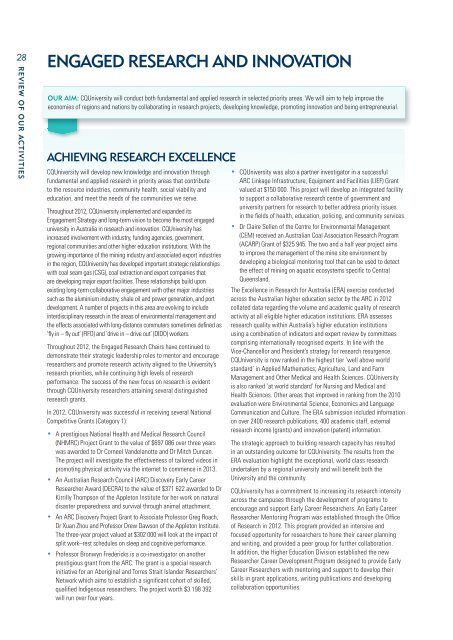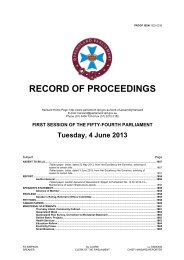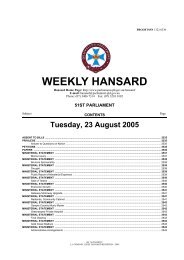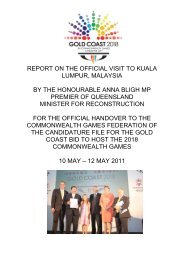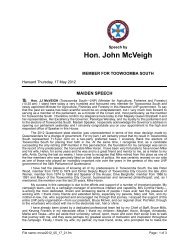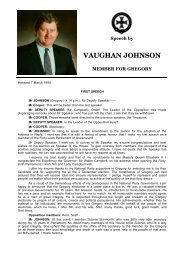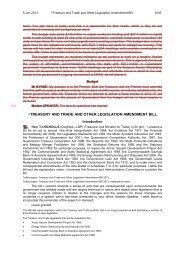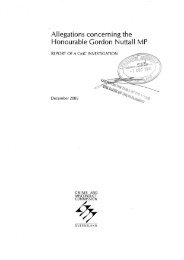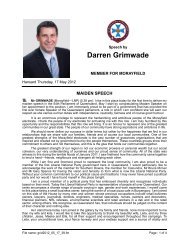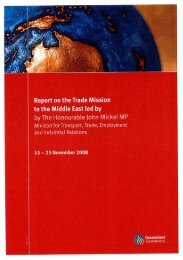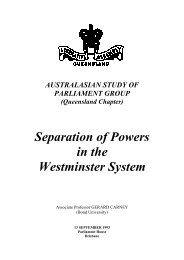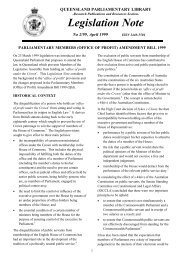CQUniversity Annual Report - Central Queensland University
CQUniversity Annual Report - Central Queensland University
CQUniversity Annual Report - Central Queensland University
Create successful ePaper yourself
Turn your PDF publications into a flip-book with our unique Google optimized e-Paper software.
28<br />
REVIEW OF OUR ACTIVITIES<br />
ENGAGED RESEARCH AND INNOVATION<br />
OUR AIM: <strong>CQ<strong>University</strong></strong> will conduct both fundamental and applied research in selected priority areas. We will aim to help improve the<br />
economies of regions and nations by collaborating in research projects, developing knowledge, promoting innovation and being entrepreneurial.<br />
ACHIEVING RESEARCH EXCELLENCE<br />
<strong>CQ<strong>University</strong></strong> will develop new knowledge and innovation through<br />
fundamental and applied research in priority areas that contribute<br />
to the resource industries, community health, social viability and<br />
education, and meet the needs of the communities we serve.<br />
Throughout 2012, <strong>CQ<strong>University</strong></strong> implemented and expanded its<br />
Engagement Strategy and long-term vision to become the most engaged<br />
university in Australia in research and innovation. <strong>CQ<strong>University</strong></strong> has<br />
increased involvement with industry, funding agencies, government,<br />
regional communities and other higher education institutions. With the<br />
growing importance of the mining industry and associated export industries<br />
in the region, <strong>CQ<strong>University</strong></strong> has developed important strategic relationships<br />
with coal seam gas (CSG), coal extraction and export companies that<br />
are developing major export facilities. These relationships build upon<br />
existing long-term collaborative engagement with other major industries<br />
such as the aluminium industry, shale oil and power generation, and port<br />
development. A number of projects in this area are evolving to include<br />
interdisciplinary research in the areas of environmental management and<br />
the effects associated with long-distance commuters sometimes defined as<br />
‘fly in – fly out’ (FIFO) and ‘drive in – drive out’ (DIDO) workers.<br />
Throughout 2012, the Engaged Research Chairs have continued to<br />
demonstrate their strategic leadership roles to mentor and encourage<br />
researchers and promote research activity aligned to the <strong>University</strong>’s<br />
research priorities, while continuing high levels of research<br />
performance. The success of the new focus on research is evident<br />
through <strong>CQ<strong>University</strong></strong> researchers attaining several distinguished<br />
research grants.<br />
In 2012, <strong>CQ<strong>University</strong></strong> was successful in receiving several National<br />
Competitive Grants (Category 1):<br />
• A prestigious National Health and Medical Research Council<br />
(NHMRC) Project Grant to the value of $697 086 over three years<br />
was awarded to Dr Corneel Vandelanotte and Dr Mitch Duncan.<br />
The project will investigate the effectiveness of tailored videos in<br />
promoting physical activity via the internet to commence in 2013.<br />
• An Australian Research Council (ARC) Discovery Early Career<br />
Researcher Award (DECRA) to the value of $371 622 awarded to Dr<br />
Kirrilly Thompson of the Appleton Institute for her work on natural<br />
disaster preparedness and survival through animal attachment.<br />
• An ARC Discovery Project Grant to Associate Professor Greg Roach,<br />
Dr Xuan Zhou and Professor Drew Dawson of the Appleton Institute.<br />
The three-year project valued at $302 000 will look at the impact of<br />
split work–rest schedules on sleep and cognitive performance.<br />
• Professor Bronwyn Fredericks is a co-investigator on another<br />
prestigious grant from the ARC. The grant is a special research<br />
initiative for an Aboriginal and Torres Strait Islander Researchers’<br />
Network which aims to establish a signifi cant cohort of skilled,<br />
qualified Indigenous researchers. The project worth $3 198 392<br />
will run over four years.<br />
• <strong>CQ<strong>University</strong></strong> was also a partner investigator in a successful<br />
ARC Linkage Infrastructure, Equipment and Facilities (LIEF) Grant<br />
valued at $150 000. This project will develop an integrated facility<br />
to support a collaborative research centre of government and<br />
university partners for research to better address priority issues<br />
in the fi elds of health, education, policing, and community services.<br />
• Dr Claire Sellen of the Centre for Environmental Management<br />
(CEM) received an Australian Coal Association Research Program<br />
(ACARP) Grant of $325 945. The two and a half year project aims<br />
to improve the management of the mine site environment by<br />
developing a biological monitoring tool that can be used to detect<br />
the effect of mining on aquatic ecosystems specific to <strong>Central</strong><br />
<strong>Queensland</strong>.<br />
The Excellence in Research for Australia (ERA) exercise conducted<br />
across the Australian higher education sector by the ARC in 2012<br />
collated data regarding the volume and academic quality of research<br />
activity at all eligible higher education institutions. ERA assesses<br />
research quality within Australia’s higher education institutions<br />
using a combination of indicators and expert review by committees<br />
comprising internationally recognised experts. In line with the<br />
Vice-Chancellor and President’s strategy for research resurgence.<br />
<strong>CQ<strong>University</strong></strong> is now ranked in the highest tier ‘well above world<br />
standard’ in Applied Mathematics; Agriculture, Land and Farm<br />
Management and Other Medical and Health Sciences. <strong>CQ<strong>University</strong></strong><br />
is also ranked ‘at world standard’ for Nursing and Medical and<br />
Health Sciences. Other areas that improved in ranking from the 2010<br />
evaluation were Environmental Science, Economics and Language<br />
Communication and Culture. The ERA submission included information<br />
on over 2400 research publications, 400 academic staff, external<br />
research income (grants) and innovation (patent) information.<br />
The strategic approach to building research capacity has resulted<br />
in an outstanding outcome for <strong>CQ<strong>University</strong></strong>. The results from the<br />
ERA evaluation highlight the exceptional, world class research<br />
undertaken by a regional university and will benefi t both the<br />
<strong>University</strong> and the community.<br />
<strong>CQ<strong>University</strong></strong> has a commitment to increasing its research intensity<br />
across the campuses through the development of programs to<br />
encourage and support Early Career Researchers. An Early Career<br />
Researcher Mentoring Program was established through the Offi ce<br />
of Research in 2012. This program provided an intensive and<br />
focused opportunity for researchers to hone their career planning<br />
and writing, and provided a peer group for further collaboration.<br />
In addition, the Higher Education Division established the new<br />
Researcher Career Development Program designed to provide Early<br />
Career Researchers with mentoring and support to develop their<br />
skills in grant applications, writing publications and developing<br />
collaboration opportunities.


